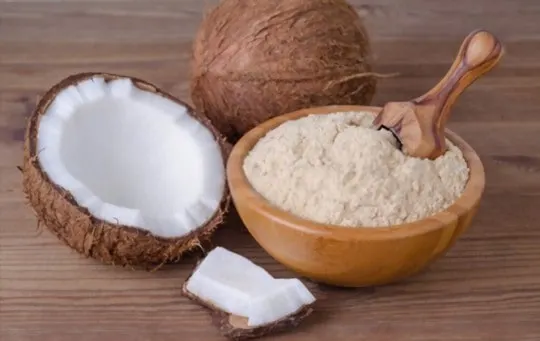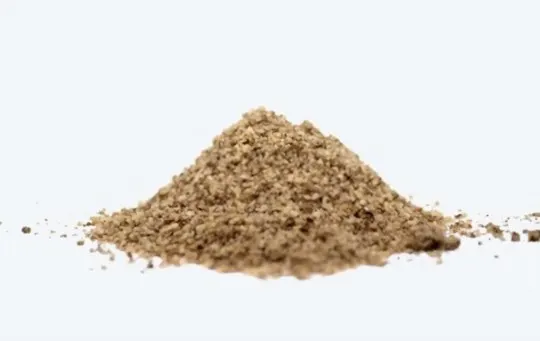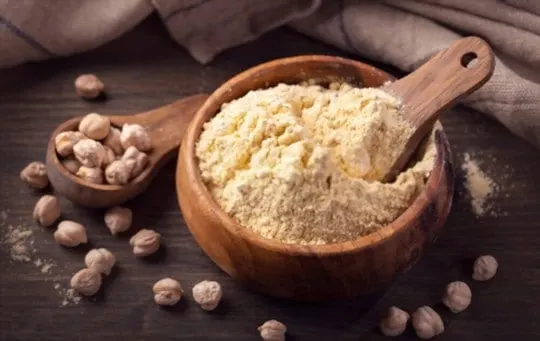Baking’s a wild ride. Sometimes you’re all set to whip up that Instagram-worthy loaf, only to find your pantry’s out of peanut flour.
Gear up, friends! We’ve cracked the code with some top-notch swaps.
Oat flour? Almond meal? We’re spilling all the best secrets today.
Diving into baking hacks doesn’t mean giving up on taste or texture. It’s all about swapping smart, not hard.
Think of it as your kitchen’s flex zone – where missing ingredients spark even cooler creations.
Stick with us, and you’ll master the art of the swap. Ready to change the game?
What is Peanut Flour?

Peanut flour is a versatile ingredient that can be used in various recipes.
It is made from ground peanuts that have been roasted and hulled.
The resulting product is a fine, powdery flour with a nutty flavor.
Peanut flour is a good source of protein and fiber, and it is also gluten-free.
It can be used to bake cakes, cookies, and bread, or it can be added to smoothies and shakes for an extra boost of protein.
Peanut flour can also be used as a coating for chicken or fish.
When combined with water, it forms a sticky paste that helps seal in the moisture and flavors of the food.
Peanut flour is an inexpensive and easy way to add flavor and nutrition to your diet.
The 4 Best Substitutes for Peanut Flour
Peanut flour is a versatile ingredient used in various recipes, especially for those with peanut allergies or dietary restrictions.
However, if you are looking for alternatives to peanut flour or need a substitute due to availability, there are several options to consider.
In this guide, we will compare the top 4 substitutes for peanut flour, discussing their key characteristics and suggesting proper ratios to help you find suitable alternatives.
| Substitute | Key Characteristics | Proper Ratio |
|---|---|---|
| Almond Flour | Made from finely ground almonds, it has a slightly sweet and nutty flavor, and a similar texture to peanut flour | Use an equal amount of almond flour as a substitute for peanut flour |
| Coconut Flour | Made from dried and ground coconut meat, it has a mild coconut flavor and adds moisture to baked goods | Use 1/4 to 1/3 cup of coconut flour for every cup of peanut flour |
| Pecan Flour | Made from finely ground pecans, it has a rich and buttery flavor, and adds depth to recipes | Use an equal amount of pecan flour as a substitute for peanut flour |
| Chickpea Flour | Made from ground chickpeas, it has a nutty flavor and is rich in protein and fiber | Use an equal amount of chickpea flour as a substitute for peanut flour |
Now, let’s dive into each substitute in more detail:
1 – Almond Flour

First on the list is almond flour.
Almond flour, sometimes referred to as almond meal, is a great ingredient to use when looking for a replacement for peanut flour.
It’s relatively easy to find in most supermarkets and has a subtle flavor that works well with savory and sweet recipes.
Unlike peanut flour, which can be hard to find and has the potential to cause allergies in some people, almond flour is easy to come by and can be used safely by most individuals.
It works well as a thickener in sauces and soups or as a coating for baked goods like fried fish or chicken fingers.
In short, if you’re looking for an alternative to peanut flour that provides similar benefits with less risk of negative side effects, almond flour is an excellent option.
- Key Characteristics: Almond flour is made from finely ground almonds, offering a slightly sweet and nutty flavor. It has a texture similar to peanut flour and can be a suitable replacement in many recipes.
- Proper Ratio: Use an equal amount of almond flour as a substitute for peanut flour. Adjust the quantity based on personal preference and desired texture.
2 – Coconut Flour

Peanut flour is a common ingredient in many baking recipes, but it can be challenging to find and expensive.
Coconut flour is a great alternative that is widely available and relatively inexpensive.
Coconut flour is made from the pulp of the coconut, which is rich in fiber.
This makes it perfect for baked goods as it helps to absorb moisture and create a light, fluffy texture.
When substituting coconut flour for peanut flour, it is essential to remember that coconut flour is very absorbent.
As a result, you will need to use less coconut flour than peanut flour.
You may also need to add additional liquid to your recipe to compensate for the absorbency of the coconut flour.
With a bit of trial and error, you will be able to substitute coconut flour for peanut flour in any recipe easily.
- Key Characteristics: Coconut flour is made from dried and ground coconut meat. It has a mild coconut flavor and adds moisture to baked goods. While it may not replicate the exact taste of peanut flour, it can be used as a substitute in various recipes.
- Proper Ratio: Use 1/4 to 1/3 cup of coconut flour for every cup of peanut flour. Coconut flour absorbs more liquid, so additional adjustments may be necessary.
3 – Pecan Flour

Pecan flour is a delicious and nutritious alternative to traditional wheat or grain flour.
Made from ground pecans, this versatile product contains many nutrients, including healthy fats, protein, vitamins, and minerals.
In addition, pecan flour has a rich and delicious flavor that makes it perfect for cooking and baking applications.
Whether used to create savory treats like pizza crusts and biscuits or sweet dishes like cakes and cookies, pecan flour always adds richness and complexity.
So if you’re looking for a unique twist on your favorite recipes, don’t forget to incorporate pecan flour into your next culinary creation.
- Key Characteristics: Pecan flour is made from finely ground pecans, offering a rich and buttery flavor. It adds depth and richness to recipes, making it a suitable alternative to peanut flour.
- Proper Ratio: Use an equal amount of pecan flour as a substitute for peanut flour. Adjust the quantity based on personal preference and desired flavor intensity.
4 – Chickpea Flour

Whether you are looking for an easy way to add more protein and fiber to your diet or want to try something new in the kitchen, chickpea flour is a perfect choice.
Chickpea flour, also known as gram or besan flour, is a popular ingredient in Indian and international cuisines.
Made from dry ground chickpeas, this versatile flour is nutrient-rich and low in fat, making it a healthy addition to any meal.
It works well in both savory and sweet dishes and can be used to make everything from pancakes and flatbreads to fritters and cookies.
Chickpea flour has a nutty flavor that combines beautifully with spices like cumin, coriander, turmeric, chili powder, and garlic.
- Key Characteristics: Chickpea flour, also known as garbanzo bean flour, is made from ground chickpeas. It has a nutty flavor and is rich in protein and fiber. It can be used as a suitable substitute for peanut flour in various recipes.
- Proper Ratio: Use an equal amount of chickpea flour as a substitute for peanut flour. Adjust the quantity based on personal preference and desired texture.
Conclusion
When it comes to finding healthy, nutritious substitutes for traditional ingredients, peanut flour is a great choice.
Its high protein content and rich, nutty flavor can be used in everything from baked goods to smoothies with excellent results.
However, while peanut flour may be one of the best options, it certainly isn’t the only substitute worth considering.
Other great alternatives include almond flour, coconut flour, pecan flour, and chickpea flour.
Each of these flours has its own unique set of nutritional benefits and a distinct flavor that makes them perfect for different culinary applications.

The 4 Best Substitutes for Peanut Flour
Ingredients
- Almond Flour
- Coconut Flour
- Pecan Flour
- Chickpea Flour
Instructions
- Pick your favorite substitute from the list above.
- Follow cooking directions for your selected substitute with the proper ratio of ingredients.

Andrew Gray is a seasoned food writer and blogger with a wealth of experience in the restaurant and catering industries. With a passion for all things delicious, Andrew has honed his culinary expertise through his work as a personal chef and caterer.
His love for food led him to venture into food writing, where he has contributed to various online publications, sharing his knowledge and insights on the culinary world. As the proud owner of AmericasRestaurant.com, Andrew covers a wide range of topics, including recipes, restaurant reviews, product recommendations, and culinary tips.
Through his website, he aims to inspire and educate fellow food enthusiasts, offering a comprehensive resource for all things food-related.

Leave a comment